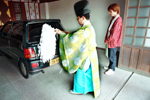Covering
Japan: Nagasaki Journal |
The Students
The Classes
Foresighted
Insurance Seller Keeps Working by Changing to a Career Helping Elderly
in Homes
By Carole-Anne Elliott
Special to the Mercury News
(This story originally appeared in the San Jose Mercury
News on August 8, 2002. Click here
to view it on the Mercury News web site)
NAGASAKI, Japan – Yoko Jyono is one of the lucky ones. Led by her
heart toward a new career, and blessed with excellent timing, she was
able to reposition herself and land a new job.
At age 51, she narrowly missed suffering the same type of business collapse
that has catapulted many older workers in Nagasaki out of their jobs and
into an uneasy future.
For 10 years, Jyono watched her mother care for her grandmother, who was
in her 90s and confined to bed the last two years of her life. During
that time, a "home helper'' visited, stopping by twice a week to
help bathe and dress Jyono's grandmother. The experience left an impression
on Jyono.
"Taking care of elders is an important job,'' said Jyono, the mother
of three sons, ages 17 to 24. "Of course, the family member is the
main person, but those people need help.''
 Yoko Jyono practices changing the kimono on Mieko Sakimura, who like Jyono is a home health aide. Jyono helps elderly people in their homes. |
Jyono thought she would enjoy the same
kind of work. So two years ago, while keeping her full-time job selling
life insurance for the Nagasaki branch of a national company, she went
once a week to a training course for home helpers.
Over three months, she learned how to bathe the elderly, prepare easily
digestible food and keep them from getting bedsores. She was certified
in August 2000.
During that time, a rumor began circulating that her insurance company
was in financial trouble. Customers who heard the rumor stopped buying
policies. The company soon went bankrupt, and everyone was out of a job.
Everyone except Jyono.
Just a week earlier, she had quit and joined a home-helper company called
Kind Hand. For nearly two years now, she has cleaned houses, shopped for
and spent hours talking to elders whose family members must work during
the day.
"As a human being, to help someone, especially a weak person, is
very satisfying,'' said Jyono. "Someday, my mother or husband may
need help. I hope this job could help me take care of them.''
Japan will need more people like Jyono in the future because life spans
are lengthening: The average Japanese man now lives to age 77, the average
Japanese woman to 84.
But despite the demand, those jobs will not necessarily be easy to get.
Kind Hand President Toshi Sugisawa said that he would continue to advertise
for home helpers throughout the year, but that only very qualified people
would be hired.
For Yoko Jyono, the pull of personal interest led her to a new job at
the right time.

